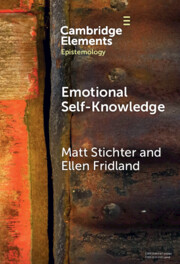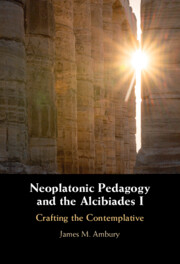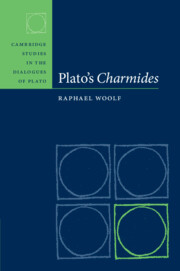Refine search
Actions for selected content:
64 results
Boyle’s Elusive Egoism
-
- Journal:
- Canadian Journal of Philosophy , FirstView
- Published online by Cambridge University Press:
- 27 November 2025, pp. 1-12
-
- Article
-
- You have access
- Open access
- HTML
- Export citation
Chapter 6 - Awakening Autonomy
- from Part III - Internal and External Authorities
-
-
- Book:
- Platonic Autonomy
- Published online:
- 07 August 2025
- Print publication:
- 31 July 2025, pp 128-146
-
- Chapter
- Export citation
Chapter 7 - The Philosophy of Desire
-
- Book:
- Ovid and Plato
- Published online:
- 19 June 2025
- Print publication:
- 03 July 2025, pp 114-140
-
- Chapter
- Export citation

Emotional Self-Knowledge
- How Affective Skills Reveal Our Values, Goals, Cares, and Concerns
-
- Published online:
- 09 June 2025
- Print publication:
- 03 July 2025
-
- Element
- Export citation
What Do We Owe Our Genetic Relatives?
-
- Journal:
- Journal of the American Philosophical Association / Volume 11 / Issue 3 / September 2025
- Published online by Cambridge University Press:
- 20 March 2025, pp. 562-580
-
- Article
-
- You have access
- Open access
- HTML
- Export citation
Knowing One’s Nature as Self-Knowledge
-
- Journal:
- New Blackfriars / Volume 106 / Issue 1 / January 2025
- Published online by Cambridge University Press:
- 16 January 2025, pp. 13-26
- Print publication:
- January 2025
-
- Article
- Export citation
9 - Pamprosopon
- from Part III - Intellect
-
- Book:
- Plotinus on the Contemplation of the Intelligible World
- Published online:
- 03 September 2024
- Print publication:
- 21 November 2024, pp 319-351
-
- Chapter
- Export citation
7 - All Together in Eternity
- from Part III - Intellect
-
- Book:
- Plotinus on the Contemplation of the Intelligible World
- Published online:
- 03 September 2024
- Print publication:
- 21 November 2024, pp 261-293
-
- Chapter
- Export citation
6 - Looking into Our Face
- from Part III - Intellect
-
- Book:
- Plotinus on the Contemplation of the Intelligible World
- Published online:
- 03 September 2024
- Print publication:
- 21 November 2024, pp 229-260
-
- Chapter
- Export citation
Speaking Sense: A Hybrid Source of Justification for Self-Knowledge
-
- Journal:
- Episteme , First View
- Published online by Cambridge University Press:
- 23 October 2024, pp. 1-18
-
- Article
-
- You have access
- Open access
- HTML
- Export citation
Chapter 7 - Personal Intelligences
- from Part II - Transition Expertise
-
- Book:
- Transition Expertise and Identity
- Published online:
- 30 May 2024
- Print publication:
- 06 June 2024, pp 110-144
-
- Chapter
- Export citation
Chapter 1 - The Self-Knowledge Necessity
-
- Book:
- Neoplatonic Pedagogy and the Alcibiades I
- Published online:
- 16 May 2024
- Print publication:
- 23 May 2024, pp 12-27
-
- Chapter
- Export citation
Introduction
-
- Book:
- Neoplatonic Pedagogy and the Alcibiades I
- Published online:
- 16 May 2024
- Print publication:
- 23 May 2024, pp 1-11
-
- Chapter
- Export citation
Chapter 2 - Exalting Eros
-
- Book:
- Neoplatonic Pedagogy and the Alcibiades I
- Published online:
- 16 May 2024
- Print publication:
- 23 May 2024, pp 28-74
-
- Chapter
- Export citation
Chapter 4 - What Do I Want?
-
- Book:
- Neoplatonic Pedagogy and the Alcibiades I
- Published online:
- 16 May 2024
- Print publication:
- 23 May 2024, pp 152-166
-
- Chapter
- Export citation

Neoplatonic Pedagogy and the Alcibiades I
- Crafting the Contemplative
-
- Published online:
- 16 May 2024
- Print publication:
- 23 May 2024
Chapter 2 - The Stance of Enquiry
-
- Book:
- Plato's <i>Charmides</i>
- Published online:
- 20 July 2023
- Print publication:
- 10 August 2023, pp 30-59
-
- Chapter
- Export citation
Chapter 4 - Interpreting Temperance
-
- Book:
- Plato's <i>Charmides</i>
- Published online:
- 20 July 2023
- Print publication:
- 10 August 2023, pp 145-207
-
- Chapter
- Export citation
Chapter 5 - The Art of Self-Realisation
-
- Book:
- Plato's <i>Charmides</i>
- Published online:
- 20 July 2023
- Print publication:
- 10 August 2023, pp 208-252
-
- Chapter
- Export citation

Plato's Charmides
-
- Published online:
- 20 July 2023
- Print publication:
- 10 August 2023
